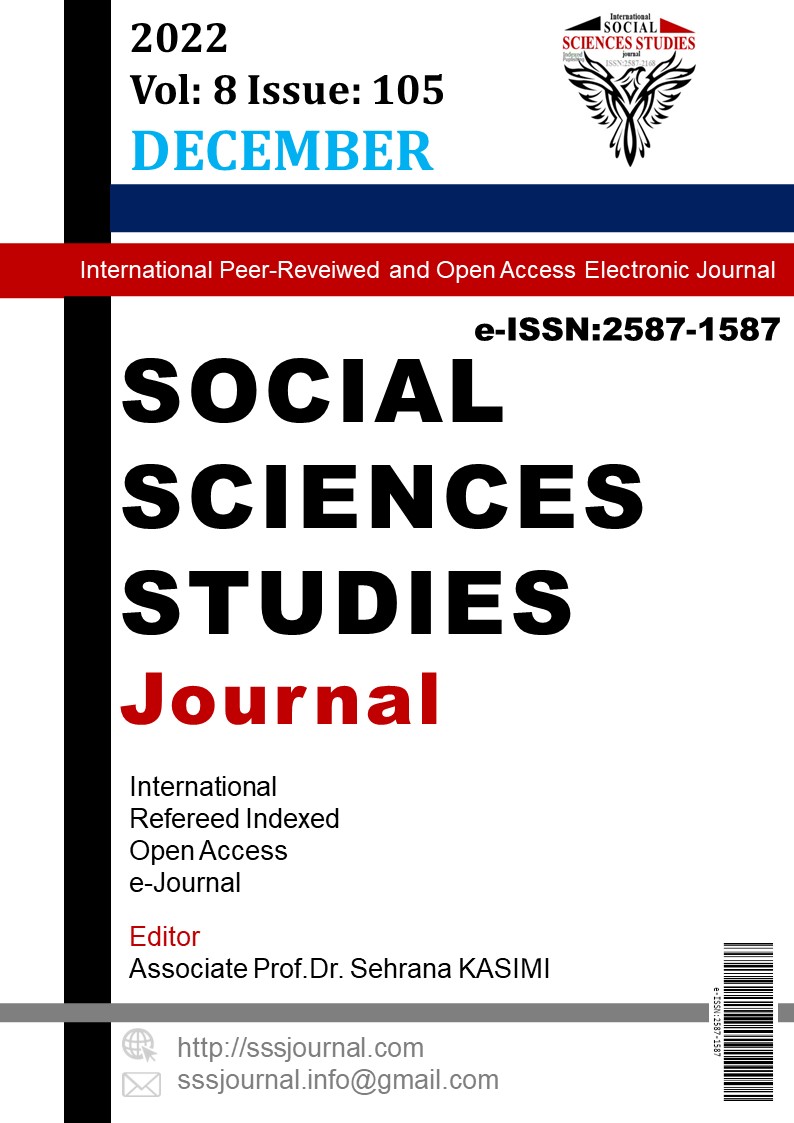Author :
Abstract
Lozan Barış Antlaşması ile Ermeniler, Rumlar ve Yahudiler olarak varlığı tanımlanan Türkiye azınlıkları ve okulları, Osmanlı’dan günümüze hakkında en çok tartışılan konuların başında gelmiştir. Diğer eğitim kurumları gibi azınlık okulları bazında da tartışılan problemlere çözüm olması ve tüm eğitim kurumlarının tek çatı altında toplanması amacıyla cumhuriyetin ilanıyla birlikte Tevhid-i Tedrisat Kanunu hazırlanmıştır. Tevhid-i Tedrisat Kanununun yasalaşmasıyla başlayan eğitim-öğretim kurumlarındaki köklü değişim ve dönüşüm sürecinden azınlık okulları da doğrudan etkilenmiştir. Bu çalışma günümüze değin azınlık eğitim kurumlarındaki din eğitimini; müfredatları, kullandıkları materyalleri, ölçme ve değerlendirme teknikleri, sınıf içi etkinlikler ile Din Kültürü ve Ahlak Bilgisi dersi öğretmenleri gibi başlıklar altında çok yönlü olarak incelemektedir. Ayrıca azınlık okullarının din dersiyle alakalı materyal ve öğretmen teminindeki güçlükler, eğitim dili, yetersiz fiziki imkanlar ve maddi sıkıntılar gibi belli başlı sorunlarını da ele almaktadır. Araştırmanın hakkında yeterli çalışma bulunmayan bu alana ışık tutacağı düşünülmektedir. Ayrıca bu çalışmada Özel Bomonti Ermeni Katolik Okulu ve Özel Gökçeada Rum Okullarında din eğitimi, mülakat, gözlem, veri analizi ve kaynak tarama yolları kullanarak ele almıştır.
Keywords
Abstract
The existence of Turkish minorities, identified as Armenians, Greeks and Jews with the Lausanne Peace Treaty and the minority schools, has always been one of the most discussed issues from the Ottoman period to the present. With the proclamation of the republic, the Law of Unification of Education (Tevhid-i Tedrisat) was prepared in order to gather all educational institutions under one roof. In this way, it was aimed to find solutions to the existing problems in the minority schools, as well as, in other educational institutions of Turkey. The radical change and transformation process in educational institutions, which started with the aforementioned enactment of the Law of Unification of Education, directly affected minority schools too. However, neither the changes nor the stages that minority education institutions have gone through within this process have previously been studied in a multi-faceted manner. To put it more clearly, the kind of religious education that minority students receive has not been investigated thoroughly, that is in reference to school materials, measurement and evaluation techniques, and classroom activities, as well as the problems experienced by the teachers of the minority schools in their relation with teachers of Religious Culture and Moral Knowledge. In this respect, the present study is expected to shed light on this relatively less studied area of education in the Turkish context. The study also investigates religious education at the Private Bomonti Armenian Catholic School and Private Gökçeada Greek Schools in Turkey through data collection techniques such as interviews and observation, and data analyses based on a thorough literature review.
Keywords
- 1. Acuner, H. Y. & Türkan, M. (2016). Türkiye’de Din Eğitimi Alanı’nda Yapılan Lisansüstü Çalışmaların Konu Yönelimleri, Uluslararası Sosyal Araştırmalar Dergisi, 9, (43), s: 1339.
- 2. Akay, Burak. (2018, 05 Mayıs). Yarım Asır Sonra Açılan İki Okul ile Dostluk Köprüsü Oluştu.
- 4. Aydın, M. Z. (2014). Dünden Bugüne Türkiye’de Din Eğitimi, Kamuda Sosyal Politika Dergisi, 8, (29), s: 68- 69.
- 5. Azınlık. (2022, 09 Eylül). https://sozluk.gov.tr/
- 6. Bahçekapılı, M. (2012). Türkiye’de Din Eğitimini Dönüşümü (1997-2012), İlke Yayınları, s: 194-202.
- 7. Baltacı, A. (2019). Nitel Araştırma Süreci: Nitel Bir Araştırma Nasıl Yapılır? Ahi Evran Üniversitesi Sosyal Bilimler Enstitüsü Dergisi (AEÜSBED), 5(2), s: 369.
- 8. Büyükkarcı, S. (2003). İstanbul Ermeni Okulları, Yelken Yayınları.
- 9. Büyükkarcı, S., (2003). Türkiye’de Rum Okulları, Yelken Yayınları.
- 10. Çapar, M. (2005). Cumhuriyet’in İlk Yıllarında Azınlık Okulları ve Eğitim, İnsan Bilimleri İçin Kaynak Araştırmaları Dergisi, No:19, s: 412.
- 11. Çoban, F. & Burulday, A. F. (2015). Yunan Milliyetçiliğinin ve Mütekabiliyet İlkesinin Yunanistan’daki Müslüman Türk Azınlığın Haklarına Etkileri, Uluslararası Sosyal Araştırmalar Dergisi, 8, (38), s: 347.
- 12. Çorbacı, O. K. (2022). Azınlık Örgün Eğitim Kurumlarında Cumhuriyet Sonrası Din Eğitimi ve Müfredatları: İstanbul Ermeni Okulları Örneği, İstanbul Üniversitesi Sosyal Bilimler Enstitüsü Doktora Tezi, İstanbul, s: 117118.
- 13. Dayıoğlu, A. (2021). Batı Trakya Müslüman-Türk Azınlığının Uluslararası Hukuktan Doğan Eğitim Hakları, Lefke Avrupa Üniversitesi Sosyal Bilimler Dergisi, XII, (II), s: 237.
- 14. Deri, M. (2009). Türkiye’de Azınlıklar ve Azınlık Okulları (Rum-Yahudi ve Ermeni Cemaatleri), IQ Kültür Sanat Yayıncılık, İstanbul, s: 185.
- 15. Erdem, F. H. & Öngüç, B. (2021). Süryanice Anadilinde Eğitim Hakkı: Sorunlar ve Çözüm Önerileri, Dicle Üniversitesi Hukuk Fakültesi Dergisi, 26, (44), s: 29.
- 16. Eryılmaz, B. & Bektaş, M. (2017). Lozan Perspektifinden Türkiye’de Azınlık Politikaları (1923-2016), Marmara Üniversitesi Siyasal Bilimler Dergisi, 5(2), s: 36-45.
- 17. Gültekin, U. (2017, 03 Şubat). Yeni Müfredat Yine Eskisi Gibi, https://www.agos.com.tr/tr/yazi/17637/yeni- mufredat-yine-eskisi-gibi
- 18. İleri, İ. (2005). Azınlıkların Eğitimi, OTAM Ankara Üniversitesi Osmanlı Tarihi Araştırma ve Uygulama Merkezi Dergisi, 17, (17), s: 312.
- 19. Kaya, N. (2013), Geçmişten Günümüze Azınlık Okulları: Sorunlar ve Çözüm Önerileri, Tarih Vakfı Yayınları, İstanbul, (3), s: 23.
- 20. Kaya, N. (2022, 23 Ekim). Unutmak mı Asimilasyon mu? Türkiye’nin Eğitim Sisteminde Azınlıklar, https://minorityrights.org/wp-content/uploads/2015/07/MRG_Rep_TurkeyMinEd_TURK_2009.pdf. s: 21.
- 21. Kızılabdullah, Y. (2008). Toledo Kılavuz İlkeleri ve Din Kültürü ve Ahlak Bilgisi Programı, Dini Araştırmalar Dergisi, 2, (32): 177-183.
- 22. MEB Özel Öğretim Kurumları Kanunu. (2007, 14 Şubat). T.C. Resmî Gazete, (Sayı: 26434). https://www.resmigazete.gov.tr/eskiler/2007/02/20070214-1.htm.
- 23. MEB Ortaöğretim Kurumları Yönetmeliği, (2007, 08 Şubat). (Sayı: 5580). https://www.mevzuat.gov.tr/MevzuatMetin/1.5.5580.pdf
- 24. MEB İlköğretim Din Kültürü ve Ahlak Bilgisi Dersi Öğretim Programı ve Kılavuzu. (2010).
- 25. https://dogm.meb.gov.tr/meb_iys_dosyalar/2017_08/17174424_DinKulturu_4-8.siniflar_2010.pdf
- 26. Osman, C. A. & Bağdatlı, M. (2022, 23 Ekim). Batı Trakya'da Azınlık Eğitimi, https://www.abttf.org/temel- konular.php?id=29
- 27. Özel Bomonti Ermeni Katolik İlkokulu ve Ortaokulu. (2019, Haziran 22). Bomonti Mıhitaryan 2018-2019.
- 29. Yıldırım, A. & Şimşek, H. (2005). Sosyal Bilimlerde Nitel Araştırma Yöntemleri, Seçkin Yayıncılık
